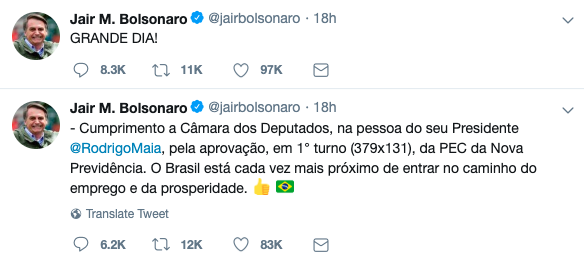In a landslide vote (379 to 131), lawmakers have just approved the foundation for new Brazilian pension reform.
What did investors hear? Cha-ching.
Brazil, the 7th most populous country in the world and the 12th largest economy, will finally establish a minimum retirement age.
The new retirement age means that Brazil’s 200+ million citizens might be working up to 10 years longer, saving the state roughly $240 billion USD and producing billions more in output.
Not exciting news for someone who has been eyeing early retirement, but riveting news for the Brazilian economy today.
If passed, the pension reform will dramatically increase Brazil’s overall productivity and economic output.
What Does the Brazilian Pension Reform Look Like?
When it comes to employee benefits and rights, Brazil is a paradise.
Federal law dictates that employers provide VR (vale-refeição, a food stipend) and VT/G (a vale-transporte/gasolina, transport/gas stipend) to all employees. Most jobs offer health insurance and significant unemployment benefits.
Here’s the kicker: Legally, Brazilians can retire after only 35 years (30 years for women) of working and paying into their federal pension system.
Let’s do the math.
This means most Brazilians retire in their early or mid-50’s (18 + 35 = 53).
With only 11% of working-age Brazilians holding degrees, the majority of the population starts hustling right out of high school.
And on that note, Brazil currently spends 10 times more on retirees than it does on education.
The New Brazilian Retirement Age Will Rake In Billions
If the pension reform is approved, the new retirement age would become 65 for men and 62 for women.
But if you’re wondering what this would mean for the economy…

Experts are estimating 900 billion reais ($236 billion USD) in state savings in the span of one decade.
On top of that, there are additional years of production and contribution from the country’s hard-working populace. This output will more than match the billions in savings for the Brazilian economy.
The President Boasts Future Prosperity
President Jair Bolsonaro gave a shout-out to the House on Wednesday via Twitter, congratulating them for the first-round approval of the PEC da Nova Previdência (Constitutional Amendment of the New Pension).
“Brazil is one more step closer to entering the right path of employment and prosperity,” he declared.
He then closed with his familiar catchphrase GRANDE DIA (BIG DAY). This term has seeped its way into Brazilian pop culture, signifying a day in which something epic has happened. Or not so epic, depending on the context.

What Investors in Brazil are Saying About the Reform
Investors are warming back up to the idea of diving into the heart of Latin America’s largest economy.
“Investors will now be looking for potential improvement in sentiment and a stronger growth profile,” reports Alberto Ramos, Goldman Sachs’ chief LATAM economist.
As a matter of fact, Brazilian Real gained traction amidst pension reform negotiations. Investors cheered when stock prices preemptively spiked on Wednesday.
The Brazilian pension reform bill will surely come up against bureaucratic hurdles and a handful of amendments before becoming law. Regardless, the fact that the draft has already hit the senate means the hardest part is over.
Keep an eye on the economic state of Brazil as well as other events that will shape the future of the economies in Latin America here at Colibri.
0 Comments